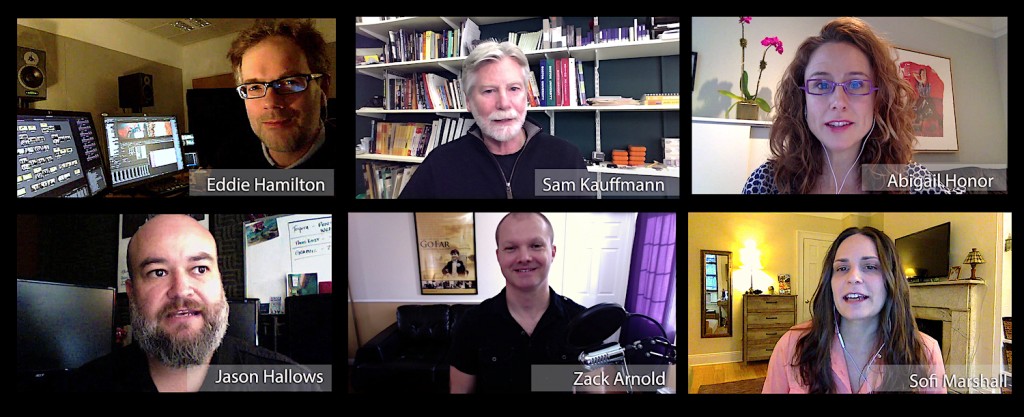How to Excel in Film (According to Successful Filmmakers)
This year, I’ve had the great fortune of holding in-depth Skype interviews with many talented filmmakers.
I’ve talked with directors, producers, editors, cinematographers and film composers working in narrative, documentary, commercial and corporate industries and then curated these conversations by topic in my LinkedIn Learning weekly series, Filmmaking Forum: Conversations.
Below, I’ve gleaned some of the best nuggets of advice from several of the episodes. Check them out, and then head over to the Filmmaking Forum series for much more. And, until the end of January, the entire series is unlocked and free for everyone!
Industry advice for editors: climb the right ladder
Quite a few of the editors I talked to discussed the “world of ladders” that define the industry. This means that if you absolutely know that you want to edit in a certain genre, try your best to start working in that genre – even if you have to work in a lower position than you would within a different area.
Here's a quote from Eddie Hamilton, feature film editor (X-Men: First Class, Mission Impossible - Rogue Nation, etc.), from Top advice for New Filmmakers and Editors:
Know where you want to end up. The film industry is based on climbing ladders, and you have to start climbing the right ladder. If it's drama... work somewhere that does drama – not somewhere that does commercials – because you'll find out that you've got lots of experience in commercials and then two years later, you're thinking, ‘Oh, I want to do drama,’ and then you'll have to start again at the bottom of a drama ladder. So pick the right ladder to climb.
Even when something doesn’t seem like the best gig – just say yes
This next suggestion to not be picky may seem to run counter to Eddie’s advice (above) about staying focused… but I think both are important in their own way, depending on the circumstances.
Indeed, for new filmmakers, it’s often smart to take on gigs that may not immediately seem appealing in order to make important connections and learn new skills.
Here's a quote from Sam Kauffmann, documentary filmmaker and film professor at Boston University, from Top advice for New Filmmakers and Editors:
Always say yes. And what I mean by that is… when someone says to you, ‘Would you like to work on this? There's not much money…’ Just say yes. Because if you say no, then you're still where you are; you haven't moved forward. But if you say yes—even if it's not exactly the right step for you, you have a new perspective. So, so many of the things that I have gotten to do have been built on all the yeses that I've said.
The director’s job: Being the master collaborator and curator of talents
The director’s job is so much more than making decisions and telling people what to do. The director is the trusted leader, and must use each person’s talents to bring together the final product in a supreme act of collaboration.
Here's a quote from Abigail Honor, director, editor and principal partner at Persona Films, from Appreciating the Director’s Job:
I'm open to ideas from everywhere. I see myself more like a sieve: so I have my big overall objective, and then I hear everybody's ideas... and what comes through the sieve, we keep, and what doesn't, stays. And also, if someone’s working with me, I expect pushback. I hired this person and I respect their opinion. They're here to enhance my vision—and never see anything that they bring to the table as criticism; it's always to make it better and better and better.
Thinking like an editor on the set
Some of the most efficient directors have a strong editing background—because being able to methodically edit the film in your head during the shoot it is invaluable to managing the stresses and schedules of a production.
Here's a quote from Jason Hallows, writer, director, editor and executive director at Transitory Zenith Productions, from Filmmaking Forum Appreciating the Director’s Job:
When I'm shooting, I approach everything as an edit, and I view everything that we're shooting as—‘how can I cut this together? Is this gonna work? Do I need coverage of this?’ And that's just kind of built into me now; it’s the only way I think. I'm constantly looking at the edit—and I'm forming it in my head as we go.
Understanding the director’s process (as an editor)
Along the same lines as Jason’s advice (above), the best editors are likewise able to climb into the director’s head. Some even go a step further and try to place themselves in the exact position of the director by watching the footage a certain way.
Here's a quote from Zack Arnold, television editor (Burn Notice, Empire, etc.), from Building a Language and a Rapport with the Director:
I watch every frame of footage that was shot—and I watch it in the order that it was shot. And what that does is help me understand the scene through the director's eyes. So if I see five takes of a master shot, and I see the transformation and the performances or the camera work between Take 1 and Take 5, I can say, ‘Oh, I can see what that director wants. I understand why they made that change.
Working together during the edit to achieve something new
The collaboration between director and editor is a very special type of connection—when it goes well. So it’s important to make sure the director and editor are in sync so that the overall productivity increases and the creative juices are able to really flow.
Here's a quote from Sofi Marshall, film editor (Wild Canaries, A Teacher, etc.), from The Director-Editor Relationship: Elevating the Project:
A good director hires an editor because they want someone else's eyes, another perspective. And you're going to have clashes and differences…. and you’ll have different ideas about how to get there—but I think that's what makes working with an editor so valuable. Because… when you try those things out together, you're both going to think of totally new things that you wouldn't have thought of by yourself. That's what makes a film so collaborative.
In addition to the Filmmaking Forum: Conversations course, I also created a Filmmaking Forum: Scene Analysis course, where each filmmaker screens a scene from a recent film and analyzes it in terms of story, structure, backstory, workflow and more. I hope you find both of these courses educational as you continue to nurture your passion for film.
Topics: Productivity tips
Related articles




